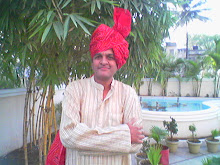
People of the country were extremely terrified by the oppression of the emperors of Delhi during the last three hundred years. But as the emperor Akbar occupied the throne of Delhi, there was a great sigh of relief and there was a new ray of hope among the people. Akbar was keen to know about various religions. Knowing their fundamental principles, he respected and honored all the religions. He tried to mitigate animosity between the Hindus and the Muslims. He made sincere efforts to temper religious fanaticism.
Once Akbar, the emperor, was standing in a balcony of his grand royal palace and had his eyes set on the highway when he saw a procession in which a shravika (a Jain laywoman) in a chariot was bowing to people all around and intermittently was making offerings to the people. She was preceded by a band and all the people in the procession sang auspicious songs.
Akbar was greatly surprised at the sight and asked the royal servants about the procession. Having inquired about it, the royal servants informed him that the shravika being a follower of the Jain religion, had undertaken fasts for six months and the Jain Sangha of Agra had organized that procession in honor of the prolonged penance of Champa, the name by which she was known.
Akbar was astonished at the fact that one could survive without food for as many as six months; since he knew too well as to how extremely difficult it was to observe ‘roja’ (a fast observed by muslims) for a month despite the permission for a meal at every night.
The royal servants added to Akbar’s astonishment as they said that the shravika named Champa had never taken a meal either during the day or at night for six long months.
Akbar thought it to be impossible; hence he decided to test its veracity. Champa shravika was invited to the court with utmost respect. Akbar told her that it was impossible that anybody could undertake such fasts. Champa shravika replied that the strength of religion would make everything possible. Akbar added that he would believe Champa shravika if she would undergo fast in the palace under the watch of his guards.
Champa shravika agreed to the proposal. She stayed at the palace with full respect and honor and guards were posted outside the palace. On expiry of the time limit, Akbar wanted to know about her fasts and he was told that she had not taken any food either during the day or at night. Akbar’s surprise was genuine. He had banned killing of any living creature for the days for which Champa shravika had gone on fast. Akbar praised and complimented her. Champa shravika said politely that it was possible because of the impact of the religion, the gods and the guru.
Akbar, the emperor, became interested and wanted to have detailed knowledge about the Jain religion. In all humbleness he requested Acharyashri Hirvijaysuriji to come to the palace for the purpose. After Bhagwan Mahavira, it was Champa shravika who had performed such a rare penance by undergoing six months fast. These fasts created great reverence in Akbar’s mind for the Jain religion, the Jain Acharyas and the Jain shravaks and shravikas. As a result he abolished the poll-tax levied on the Jain pilgrims. He acquainted himself with the significance of non-violence from Acharyashri Hirvijaysuriji - all this was the result of the most extraordinary penance of Champa shravika.
Akbar wanted to know about his horoscope and future life. Whereupon Suriji said that only householders would read horoscopes and make predictions as they were required to earn a livelihood. Saints like him simply aspired for knowledge and ultimate bliss. Akbar, by way of deference to Suriji, requested him to accept some gold and silver. Thereupon Suriji said that he would not accept anything. Suriji added that if he was keen to offer anything, he should order to set free the birds and animals kept in the cages. Suriji also added that he should prohibit large-scale fishing in the huge pond named Dabar and should also issue a mandate to stop violence of any kind by anybody during the festivals of Paryushan.
Akbar issued orders as was desired by Suriji. Moreover Akbar added 4 days on his own accord to the 8 days of Paryushan festival and ordered to stop the killing of animals for a total of 12 days. The mandate was also conveyed throughout his empire including Gujarat, Malwa, Ajmer, Delhi, Fatehpur, Lahore and far upto Multan. The Emperor also issued a mandate not to indulge in any sort of animal-killing in the vicinity of pilgrim places like Girnar, Taranga, Shatrunjaya, Kesariyaji, Abu, Rajgruhi and Sametshikharji. In Vikram Samvat 1640 Suriji was honoured with the title of Jagadguru (universal preceptor). Subsequently, Suriji toured Agra, Gwalior and other places and propagated Jain religion. As a result of his efforts, thousands of Hindus and Muslims gave up non-vegetarianism and alcoholism.
Born in A. D. 1527 in Oshwal family in Palanpur Shri Hirvijaysuriji became Acharya in A.D. 1554. After preaching Akbar, he began his journey (Vihar) at the age of 60. At that time there was a practice of charging toll-tax from every pilgrim at the Shatrunjaya Mahatirth. At the instance of Suriji, Emperor Akbar issued orders to abolish the tax. Suriji passed away in village Una (Saurashtra) in A.D. 1596. Akbar provided 100 bigha land for his funeral rites.

No comments:
Post a Comment